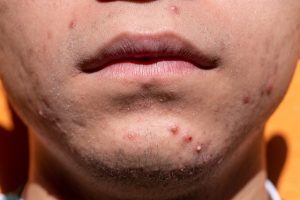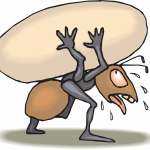Acne is a common skin condition that affects millions of people worldwide. It can have a significant impact on an individual’s self-esteem and overall quality of life.
Understanding how long acne takes to disappear is crucial for those who suffer from it, as it can help them manage their expectations and take steps to promote faster healing.
What Causes Acne?
 Acne is caused by a combination of factors, including hormones, genetics, and lifestyle choices. Hormones play a significant role in acne development, as they can cause the sebaceous glands to produce excess oil, which can clog pores and lead to breakouts. Genetics also play a role in acne development, as some individuals are more prone to developing acne than others. Lifestyle choices such as diet, stress levels, and skincare routines can also contribute to acne development.
Acne is caused by a combination of factors, including hormones, genetics, and lifestyle choices. Hormones play a significant role in acne development, as they can cause the sebaceous glands to produce excess oil, which can clog pores and lead to breakouts. Genetics also play a role in acne development, as some individuals are more prone to developing acne than others. Lifestyle choices such as diet, stress levels, and skincare routines can also contribute to acne development.
How Long Does Acne Take to Disappear?
The timeline for acne to clear up varies depending on the severity of the condition and the treatment options used. Mild cases of acne may clear up within a few weeks, while more severe cases may take several months or even years to disappear completely. Treatment options such as topical medications, oral medications, and lifestyle changes can help speed up the healing process.
What Can I Do to Speed Up the Process?
There are several things individuals can do to promote faster healing and prevent future breakouts. Maintaining a healthy diet and exercise routine can help regulate hormones and reduce stress levels, which can contribute to acne development. Establishing a consistent skincare routine that includes gentle cleansing and moisturizing can also help prevent breakouts. Medical treatments such as topical or oral medications may be necessary for more severe cases of acne.
What Are the Different Types of Acne?
There are several types of acne, including blackheads, whiteheads, cysts, and nodules. Blackheads and whiteheads are non-inflammatory types of acne that are caused by clogged pores. Cysts and nodules are more severe types of acne that are characterized by inflammation and can lead to scarring if left untreated.
What Are the Different Treatments for Acne?
The most common medical treatments for acne include topical medications such as benzoyl peroxide and retinoids, as well as oral medications such as antibiotics and isotretinoin. Alternative treatments such as natural remedies and lifestyle changes may also be effective in treating acne.
What Are the Benefits of Treating Acne?
Treating acne can have both physical and emotional benefits. Clearing up acne can improve an individual’s self-esteem and overall quality of life. It can also prevent scarring and hyperpigmentation, which can occur if acne is left untreated.
What Are the Long-Term Effects of Acne?
Untreated acne can lead to long-term effects such as scarring and hyperpigmentation. These effects can be difficult to treat and may require medical intervention. Early treatment and prevention are crucial in avoiding these long-term effects.
Acne is a common skin condition that can have a significant impact on an individual’s self-esteem and overall quality of life. Understanding how long acne takes to disappear is crucial for those who suffer from it, as it can help them manage their expectations and take steps to promote faster healing.
By establishing a consistent skincare routine, maintaining a healthy lifestyle, and seeking medical treatment when necessary, individuals can effectively manage their acne and prevent future breakouts.








